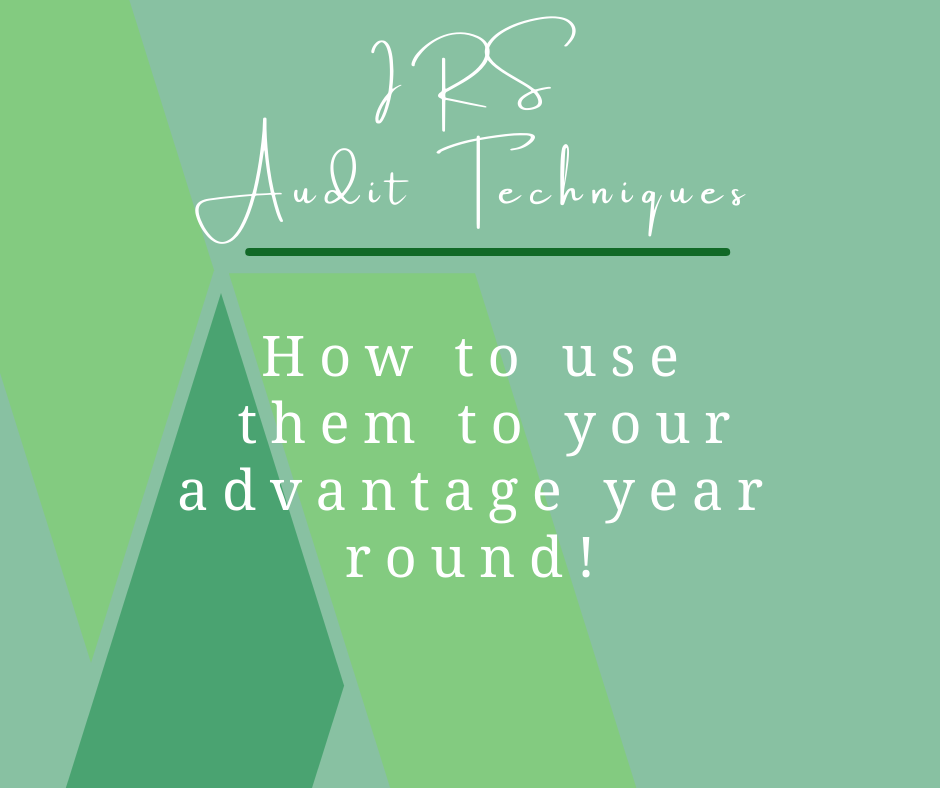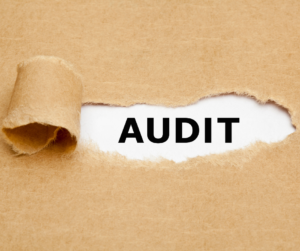Year Round Techniques to avoid IRS Audits
IRS Audit Techniques that are Helpful Year Round
As a business owner, you are in partnership with the IRS, like it or not. (Death and Taxes am I right?)
You share your net profits with the IRS according to your partnership agreement (known to you as the Internal Revenue Code).
To make sure you are sharing fairly, the IRS can audit your tax return. Now this is basically a crap shoot for any business, however for those who have ‘questionable’ expenditures. You are putting your business at greater risk of being audited.
Audits really aren’t about the unpaid taxes, interest and penalties the IRS might discover. It is about TIME, the one no no business owner really has enough of.
Tax audits can go on for months or even years. Not just the actual audit, but how much time you need to spend preparing for said audit. This time is time taken away from the business of doing your business.
So, you should consider two things here:
- How can you spend less time in an IRS audit?
- How can you pay the IRS nothing extra, or at least as little as possible, in an audit?
Getting Ready for an Audit? What you need to know.
This starts on the everyday level, you should be keeping record or the ins and out of your business financially.
Shameless plug: That’s what we do best? Sort out and keep your records so they are organized and ready if an IRS audit ever comes your way. Check up out: cdprofessionalservices.com
These records include but are not limited to: your vehicles, entertainment, meals and travel takes only minutes a day.
Something of Note: DOCUMENT, DOCUMENT DOCUMENT! Keeping an accurate record will be your best friend during an audit!
What is the IRS going to be looking for?
 Check Out the IRS Playbook
Check Out the IRS Playbook
The IRS provides documentation on what it wants its examiners to look for. And it makes a big chunk of that available to you in the Internal Revenue Manual and Audit Technique Guides (ATGs)
Currently, the IRS publishes ATGs for about 50 industries, ranging from the aerospace industry to the wine industry. (Your company will likely fit somewhere in between). The ATGs on the IRS website are available as PDF documents, web pages, or both. The ATGs explain
- Industry-specific examination techniques
- Common and unique industry issues, business practices, and terminology
- How to examine income and deductions, interview the taxpayer, and evaluate evidence.
Since there are guides for each industry here is a convenient link to the ATG web page on IRS.gov
Not only with the ATG let you understand what the IRS is looking for but why. This guide can serve as a great resource of information and practical procedures and techniques for your business on the day-to-day operations. Such as:
- Business Operations
- Inventory valuation
- Control procedures
- Cash on hand
- Personal expenditures
How Does the IRS Use the ATG?
When the IRS conducts an in-person audit of a business’ returns, it is looking to verify the accuracy of the business’s tax return and the sources of gross income. In addition to giving the IRS examiner general interview questions common to most industries, the ATG has particular questions relating to specific segments of the each industry:
This is an example of the IRS Guide for retailers:
- Grocery stores
- Electronic business
- Online retail
- Retail liquor sales
- Mobile food vendors
- Gasoline service stations
- Motor vehicle dealerships
- Auto body/repair
- Direct sellers
What is common to all examinations:
- Ledgers
- Bank statements
- Invoices
- Receipts to see whether it reported all its income
- Whether the expenses claimed are legitimate.
So, you can expect the IRS to probe into your income and revenue streams during each examination. If the gross receipts match the taxable income reported the IRS limits its examination. For you, this means that you want clean income records—which, as a businessperson, you want anyway.
On the other hand, the IRS will undertake a more in-depth examination of income if:
- The results indicate the potential for unreported income due to inaccurate reporting of taxable income from known sources
- The books cannot be reconciled to the return
- A material imbalance in the financial status analysis cannot be reconciled
If records are not available, the IRS will use one or more of the following methods to analyze the sources of income:
- Source and application of funds method
- Bank deposits and cash expenditures method
- Markup method
- Unit and volume method
- Net worth method
Why Should You Care about IRS ATGs?
Preparing tax returns is complicated, but not because the math is difficult or the accounting procedures are complicated. There are complexities in knowing what legitimate deductions are and how they are claimed on the various tax forms.
Shameless Plug: That is what a good bookkeeper can do for you! Hint….Hint…WE are Great bookkeepers!
Generally, answers to deductions are not in tax statutes, or even case law. The ATGs help by giving you insights into various deductions and options that can apply.

What you need to know…
If you are in the IRS’s crosshairs, make sure you have all of your documentation in order. Like I said before DOCUMENT, DOCUMENT DOCUMENT.
Don’t know where to start? Or you are knee deep in your business but haven’t been able to keep up with the administrative and accounting aspect of your business. We can help you start or catch up. Check out our Consultation service, find out if we are the right fit for you!
cdprofrssionalservices.com/consultation




